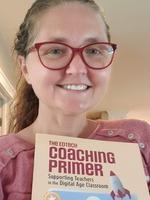


Participants will:
learn how to identify and incorporate data that is relevant for their vision and digital learning plan,
discover ways to incorporate a diverse steak-holder group,
identify metrics to ensure that growth is measured within their organization.
Introduction: A digital activity will be used to capture who is in the room and what their goals are for participation. (5-10 minutes)
Your Personalized Handbook: We will introduce participants to a digital document that they will be able to edit to create a personalized version of the handbook. This handbook includes activities, think sheets, protocols, and example documents that can be used to develop the vision and plan for any state, district, or school (10 minutes)
Creating Your Workgroup: Participants will look at how to create a workgroup of diverse stakeholders. We will review how we did this at the state-level and have participants work a similar process for identifying who they would need to include by grouping participants in like roles and having them collaborate to fully think through who might need to be involved in this process (15 minutes). We will then look at documentation items that are included in the handbook for getting potential workgroup members to apply for the opportunity, ways to evaluate and identify the best candidates for the workgroup, and identifying ways individuals who are interested in the work but did not make it onto the workgroup can contribute their voice to the process. Participants will be able to edit their materials and offer suggestions to the whole group as we go through these steps. (10 minutes).
Time Lining and Assigning Workgroup Activities: We will then look at how to backwards map the work and identify when milestones need to be completed. We will begin by going through the timeline we used in North Carolina when updating our digital learning plan. We will then utilize a protocol to get additional activities that might need to be included when creating these plans. We will then look at how to utilize choice and strengths of your team to identify which workgroup members would be best suited to the various identified tasks (15 minutes).
Gathering Feedback and Including Stakeholders: Participants will participate in a feedback protocol. Using this activity as a jumping off point we will discuss and identify ways to get the best possible feedback for their vision and digital learning plan draft and how to identify the best places to solicit this feedback. (15 minutes)
Evaluation and Follow Through: Participants will look at how North Carolina is evaluating growth and using a yearly update process to demonstrate the growth aligned to their digital learning plan. We will then utilize a table group to large group activity that will ask participants to consider what practices and procedures would be best to demonstrate their growth. (10 minutes)
Close: We will close out the session with a revisiting of the introduction activity. Participants will be asked to identify if their needs were met and be encouraged to share out networking information so they can share stories and lessons learned throughout their own process of creating their vision and plan. (5 minutes)
North Carolina Digital Learning Plan: https://www.dpi.nc.gov/districts-schools/districts-schools-support/digital-teaching-and-learning/digital-learning-initiative
Planning - The Guide to Implementing Digital Learning - SETDA: https://digitallearning.setda.org/planning/
Future Ready Framework: https://futureready.org/ourwork/future-ready-frameworks/